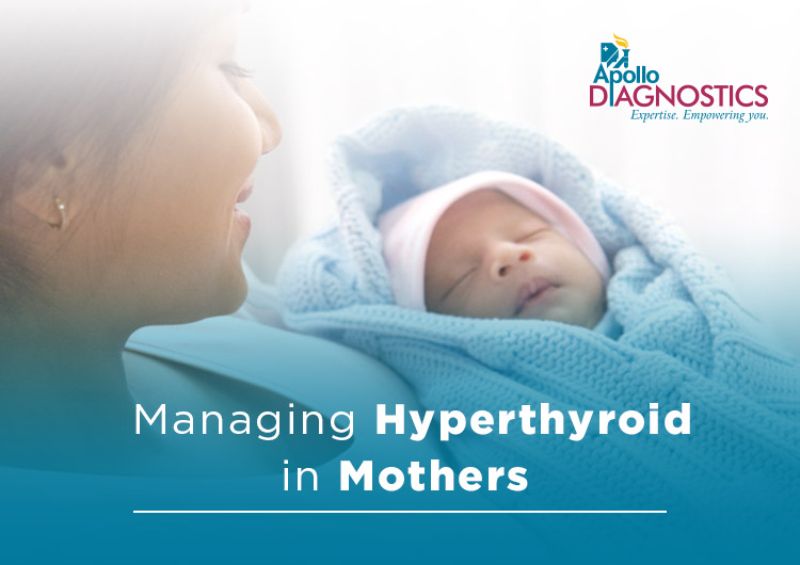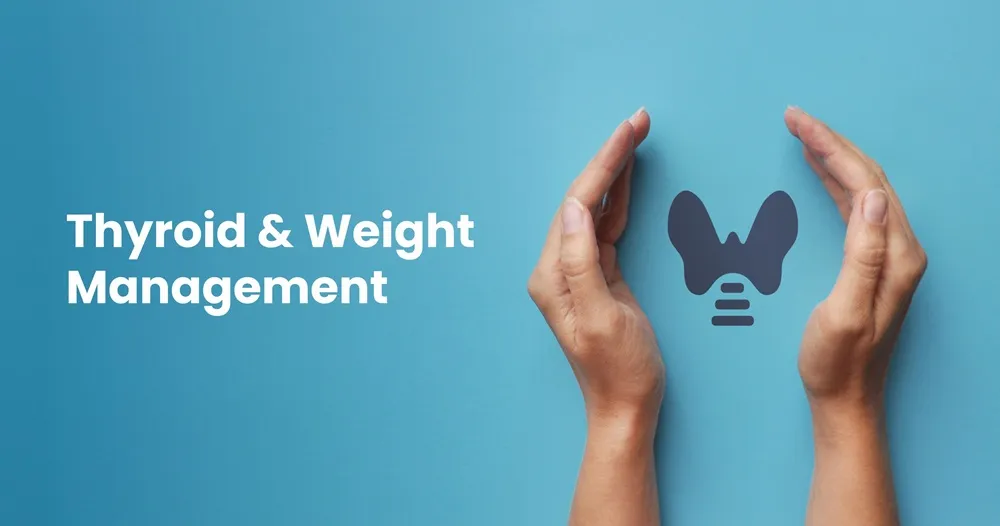Managing Hyperthyroidism in Mothers
Jun 04, 2020

Hyperthyroidism, a condition that occurs when the thyroid hormones are elevated beyond normal levels, is relatively less common in women as compared to Hypothyroidism. Further, hyperthyroidism is usually associated with an autoimmune disorder of the thyroid called as Graves’ disease. This makes the approach to management of hyperthyroidism very difficult during pregnancy.
As thyroid regulates metabolism and essential body functions, an increase in thyroid hormones leads to nervousness, tremors, increased sweating and heartbeat, intolerance of heat, and even diarrhoea. Uncontrolled or symptomatic Hyperthyroidism can have serious impact on both the mother and baby.
Hyperthyroidism and Pregnancy
The major concern in mothers with hyperthyroidism is the effect it can have on the baby. Pregnancy can also aggravate the symptoms of pre-existing hyperthyroidism. Symptoms such as shortness of breath or a heart flutter are often attributed to pregnancy but can also occur due to exacerbation of hyperthyroidism.
Hyperthyroidism is usually detected in the first half of the pregnancy, but gradually improves over the entire period of gestation. However, in many cases, it is seen that it can worsen in the postpartum period.
An increase in thyroid hormones can lead to premature birth and underdevelopment of the child. In the mother, it can lead to pre-eclampsia, a condition that is marked with severe and sometimes life-threatening hypertension. Uncontrolled hyperthyroidism can also cause a crisis called as thyroid storm which can rapidly lead to shock and death.
In some cases, it can also lead to the development of neonatal hyperthyroidism in the baby, a condition that needs to be monitored and treated carefully.
needs to be monitored and treated carefully.
 needs to be monitored and treated carefully.
needs to be monitored and treated carefully.Management of hyperthyroidism during pregnancy
Treatment of hyperthyroidism is tailored according to each patient. It depends on not only the symptoms and severity in the mother, but also the cause of hyperthyroidism.
The first step is to evaluate the patient for overall health and to understand the extent of hyperthyroidism. Complete blood profile is carried out along with thyroid profile levels. Body weight and heart rate charts are recorded and maintained on a regular basis. Wherever possible, the cause of hyperthyroidism is isolated, so that it can be treated specifically. Hypertension, when left untreated in pregnancy, can have disastrous effects on both the mother and the baby. A significant part of management of hyperthyroidism in pregnancy revolves around ensuring that blood pressure and other cardiac parameters remain within a healthy range.
Some anti-thyroid medications can lead to birth defects as well as hypothyroidism. Therefore, doctors often exercise caution in deciding which medications to prescribe. It is important to get thyroid levels checked every 4-6 weeks so that necessary adjustments in dosage of medications can also be made. The goal of the treatment is to ensure that thyroid hormones remain normal throughout pregnancy and post-delivery as well.
Fetal ultrasonography is advised after 20 weeks of pregnancy to determine if there is any evidence of fetal thyroid dysfunction. Regular monitoring of the baby's growth parameters is also necessary to ensure that the baby's developmental milestones are on track.
In rare cases when hyperthyroidism is life-threatening and cannot be treated conservatively, surgery may be advised. Surgical removal of the diseased part of the thyroid glands is beneficial in treating hyperthyroidism that is present due to local causes.
Post-delivery hyperthyroidism is much more common and this can often be confused with postpartum depression. Since hyperthyroidism tends to flare post-delivery, it is important to monitor for symptoms of hyperthyroidism as well as levels of thyroid hormones.
If you are suffering from hyperthyroidism and are planning a child or are in early stages of pregnancy, we advise you to see a doctor as soon as possible so that you can plan for a safe and healthy pregnancy and delivery.
At Apollo Diagnostics, we are backed by advanced laboratory technologies and proficient technicians that enables us to delivery trusted and timely health reports to all our patrons. To book your Thyroid Profile with us, call 9205478479 or visit www.apollodiagnostics.in
Related Blog Post
Blog Categories
- Child Health
- Mens Health
- Women's Health
- Mental Health
- Health Myths & Facts
- Fitness
- Nutrition/Recipes
- Remedies
- Weight Management
- Stress Management
- Health Supplements
- Addiction Management
- Disease Management
- Allergy
- Anemia
- Arthritis
- Asthma
- Autoimmune Diseases
- Blood Pressure
- Cancer
- Deficiencies
- Dengue/Malaria/Chikungunya
- Diabetes
- Eye Problems
- Heart Diseases
- Hepatitis
- HIV/AIDS/STD
- Hormonal Imbalance
- Infection/Flu/Viral
- Kidney
- Liver
- Menstrual Problems
- Pregnancy
- Skin & Hair Problems
- Stomach Ailments
- Thyroid
- Others
- Health Checkups
- Diagnostics/Pathology
- Lifestyle & Wellness
- Covid
- Medical Tests
- Cholesterol
- Health Tips
- Parent Care/Old Age
- Lungs
- Food Intolerance








